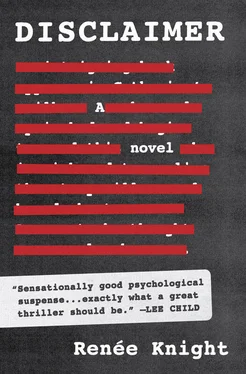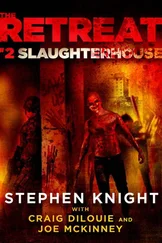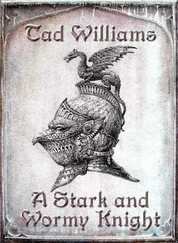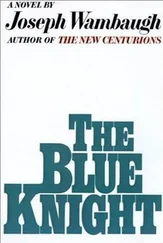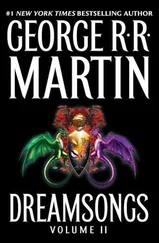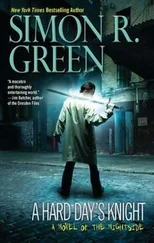He loved her though. If she’d told him about her affair back then, he would have forgiven her, but not now. He bites the inside of his cheek to stop himself crying. He would have done anything for her. He’d wanted to have more children but even that he’d given up without a fight. She didn’t refuse but she always managed to come up with an excuse until it was too late. He’d wanted Nick to have a brother or sister; he thought it would take the pressure off him. Jesus, she has destroyed everything. He will never be able to trust her.
A piece of paper lands on the table in front of him. Information he should be reading, details he should be taking in. He picks it up and hides behind it. He has a vague memory of Nick wanting the dinghy, or something inflatable, and they had agreed it was not a good idea. But she had bought it for him, when Robert had gone home, and she hadn’t watched him, she hadn’t looked after him and someone else’s son died to save Nicholas. But whose? Who wrote this book? The girlfriend? A parent? The old man who dropped off the photos. That poor old man. A bastard thing to do but can he really blame him? Should Robert thank him for what his son did? He should be grateful, but he can’t manage gratitude yet. If “ John,” or whatever the fuck his name was, hadn’t been there then “ Charlotte ” wouldn’t have been so fucking distracted and perhaps she would have stopped their son going into the sea on his own, and if Robert had been there then none of it would have happened.
There’s a throbbing mass in Robert’s head. Another in his stomach. Dark lumps of something he has not felt for years. Jealousy. Not green, but black and dense. He is jealous of this dead youth, who had an affair with his wife and saved his child. Who, a long, long time ago, in a faraway land, cut off Robert’s balls without him even realising it. He wonders how many times Catherine has thought of this boy when she has been with him. How many times has she compared the sex? Does she fake it with him? Sometimes? Always? And Nicholas. Nicholas, who can’t even remember the young man who saved his life, which to Robert makes “John” seem even more heroic. Unsung. A martyr. He flicks through the pages in his head. Robert barely gets a mention. He is a minor character who doesn’t even merit a name. Her husband.
He sinks into himself, drooping like a stakeless plant. The words have stopped. The room is quiet. He looks up. All eyes are on him, but he cannot read them. Are they waiting for a response? Are they watching him with curiosity? What do they see?
“A lot to think about,” he says and is reassured by the sound of his voice, deep and rich. He stands up, his authority here at least still intact. The meeting is over and everyone trickles from the room.
He will get in touch with the family — find out who they are and talk to them. The least Robert can do is let them know that he is grateful for their son’s bravery and try to make up for his wife’s failings as a human being. First though, he must look after Nicholas, bring him back under the protection of his wing. He picks up his phone.
“Nick? Really enjoyed seeing you the other night…. Listen, can we do it again? Are you free tonight? There’s something I want to talk to you about.”
When Jonathan died, Nancy shattered. Her mind shrank into a small, dark thing and all she could think about was our son’s absence. One step at a time, one day at a time, I kept telling her. But I couldn’t reach her. I was no use to her. I remember one day, it was about two months after his death. I’d been waiting for her downstairs. I had persuaded her to come for a walk. It was an achievement just to get her to agree to that. It was midafternoon and she was still in her dressing gown. She went upstairs to put on some clothes and I sat in the living room waiting for her. She was slow — everything she did then was slow. I didn’t want to hurry her because I was afraid that, if I went upstairs to chivvy her, she would change her mind. And anyway I could hear her moving around. I heard a drawer being opened, the wardrobe door closing. She was getting dressed; she was heading in the right direction. But after a while I didn’t hear anything, so I went up.
I expected to find her lying on the bed, but she was in the bathroom. She was fully clothed and had climbed in the bath which, it turned out, she had run hours earlier. She was lying in freezing-cold water, dressed for a walk out with me. Her head was under the water, her eyes and mouth open. I dragged her out. She was heavy, sodden. She told me she wasn’t trying to kill herself, she just wanted to know what it had felt like for Jonathan. She wanted to know whether drowning had hurt. She wanted to find out for herself whether it was as painless as everyone said — whether you passed out before dying. She was angry with me for denying her this almost-shared experience but then she acknowledged the flaw in her experiment: that the fear and loneliness of being swallowed by a vast ocean cannot be replicated by submersion in an avocado-coloured ceramic tub in the safety of your own home.
Acute empathy, you could say, had become Nancy’s extreme sport of choice. She was the most empathic of people, and yet even she knew she was seeking the impossible. But still she tried. If anyone was capable of understanding how someone else felt, it was Nancy. There just weren’t as many layers between her and the world as there were with the rest of us. She had that rare ability of really being able to stand in someone else’s shoes and get inside their skin. There had been many a time, before Jonathan died, when she had tried to help me do the same. If I was angry or upset about something, she would coax me with, “Try and see it from their point of view,” or “Try and imagine what they might be feeling,” and I did try but I never quite succeeded. Nancy felt too much though, that was the problem.
She stopped working because she couldn’t face being with children anymore, so I worked for both of us, just to keep life ticking over. A kind of life anyway. We should have sold our house and moved out of London. I should have been tougher, made the decision to do it, but I knew I couldn’t make Nancy do anything she didn’t want to. Even trying to persuade her to sort through Jonathan’s things was beyond my powers.
One day though, I came home from work and found her up in his bedroom, laying out his clothes on the bed. It reminded me of being back in the hotel room in Spain.
“I’m not getting rid of them,” she said sharply when she turned and saw me. I didn’t say anything.
“I just want a sort through,” and I watched her folding and stroking his clothes and separating them into piles, which gave me hope that perhaps she was making a start to clear out his things.
“I’ll make some tea,” I said. “Then I’ll give you a hand.” She looked at me, nodded, then carried on going through his drawers. When I came back I saw that she had started to fill a small suitcase. I put down the tea and sat on the bed, looking round. The room still had remnants of Jonathan’s boyhood: a stuffed dog, balding and scrawny sitting on top of his bookshelf; an ornate wooden puzzle box which we’d given him one Christmas and where he kept his secret things. I remember feeling a swell of sadness mingled with happiness because I thought I was witnessing the beginning of Nancy’s recovery. She had refused to touch anything in his room before now, wanting it left exactly as it was.
“I’m putting any rubbish in here,” and she shook an empty black bag at me. I sipped my tea then put it down on his bedside table and opened the drawer. I smiled at the batteries and loose change; it was almost identical to my own bedside drawer, except for the packet of unopened condoms. I emptied it all into the black bag, shaking it so the condoms disappeared to the bottom. I didn’t want Nancy to see them — there was something horribly poignant about the fact they were unused.
Читать дальше
